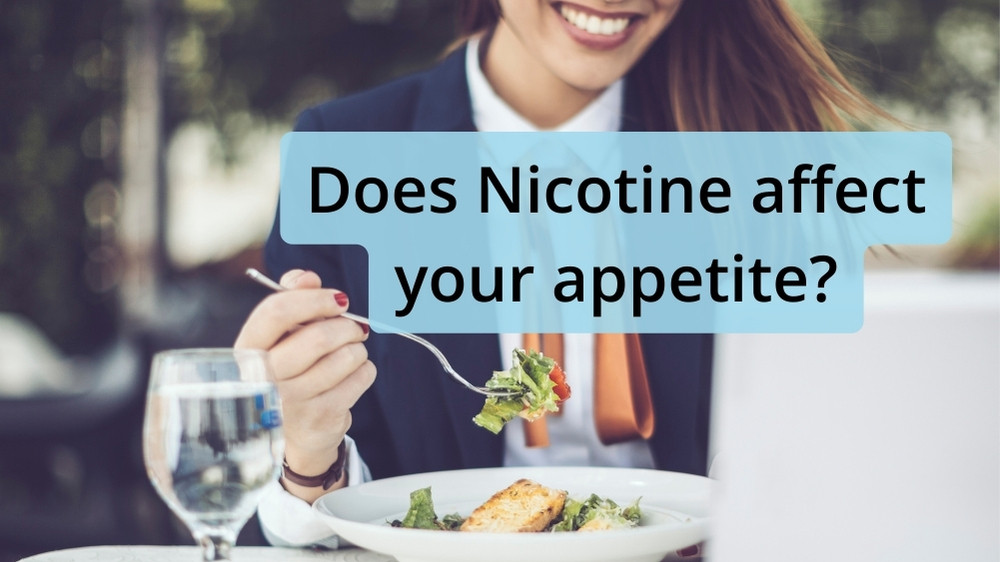Does Nicotine Affect Your Appetite?

What Is Nicotine?
Nicotine is naturally found in many plants, including tobacco and vegetables like potatoes. It’s an alkaloid that has been used for hundreds of years through tobacco use. As of recent, nicotine has begun to be isolated from tobacco and produced synthetically, used in tobacco-free products due to the harmful effects of tobacco use.
Nicotine is the substance in the likes of nicotine pouches, vapes, and cigarettes, responsible for the “pleasant” feeling caused by said products. This is enabled by nicotine interacting with the brain, leading to the release of dopamine - increasing activity in the “pleasure centre”.
Understanding Metabolism
Metabolism isn’t as simple as one substance. It’s a network of different bodily systems and serves one function - converting what you drink and eat into energy. This term describes an essential process in the body that fuels your day-to-day life. It connects many cellular pathways involved in converting food into energy, building up energy stores and breaking them down to free up energy. But how is this connected with your appetite, and how does nicotine affect this string of pathways?
What Factors Affect Metabolism?
Everyone's metabolism is different and is affected by multiple factors. As stated above, your metabolism defines a network of pathways that convert what we eat to energy, and because of the pathways involved, there are many stages at which factors can influence it.
Some of these factors that influence our metabolism include:
- In some cases, the bigger you are and the more muscle you have, the higher your metabolic rate.
- As we age, our metabolism slows, and, on average, men have faster metabolisms.
- Certain genes have a heavy influence on the rate of metabolism.
- When ill, our metabolism increases as more energy is needed to elicit an immune response.
- This increases the energy we need and, in turn, increases our metabolic rate, even when resting.
- If on a crash diet or fasting, little energy can be harvested from a small amount of food, so our body reduces our metabolism in response.
- Increase our metabolic rate, like caffeine and nicotine.
These are only a handful of different factors that can alter one's metabolic rate. But as stated above, drugs have an effect, some of which include caffeine and, more importantly, nicotine.
How Does Your Metabolism Affect Your Appetite?
Individuals' metabolism can vary as it can be quicker or slower than others, and your appetite depicts how hungry you are and, in turn, the amount you eat. A study has shown that
The higher your resting metabolic rate (RMR), the hungrier you are and the more you eat.
However, this is just a correlation, and other factors affect hunger, highlighting that this isn’t a single cause-and-effect relationship but a string of interconnected substances and pathways.
How does Nicotine Affect Your Metabolism and Appetite?
Research has shown that nicotine can increase your metabolic rate and, as a result, you can burn calories faster when using products like cigarettes and nicotine pouches. However, there is no conclusive evidence of nicotine affecting your appetite.
So, if nicotine doesn’t increase your appetite, why do so many put weight on when they stop using nicotine?
The answer is simple. When we stop our nicotine intake, in some cases, our metabolism reduces, meaning we burn fewer calories. So, by inferring, if we eat and exercise the same amount as when we used nicotine, fewer calories will be burnt, meaning we may gain weight. However, the extremity of this weight gain will differ between individuals, and some may not experience it at all.
Do Nicotine Pouches Have These Effects on Your Metabolism and Appetite?
Nicotine pouches do contain nicotine. Therefore, the effects of this alkaloid mentioned above should also be present in nicotine pouches. Although no research has directly investigated the effects of nicotine pouches on metabolism and appetite, we can infer that they can have the same effect in some cases.
Do stronger nicotine pouches affect your metabolism more?
In theory, if nicotine speeds up your metabolism, the more that’s in your system, the faster your metabolism. So, the stronger nicotine pouches may have a more profound effect on your metabolism and appetite. However, there will be a ceiling to this, and these effects will differ between users.
The Take Home Message
All the information above is a lot to digest. Still, it can simplified into the bullet points below, providing the fundamentals needed to understand nicotine, metabolism, appetite, and how they are related and affect one another.
- Metabolism is the process of converting what you eat into energy and can be affected by many factors.
- Nicotine can increase an individual's metabolic rate, so (in theory) more calories can be consumed, and the individual's weight may remain the same - in most cases.
- People’s metabolism differs. Some need more calories than others to maintain weight.
- However, each individual is different, and the effects of nicotine aren’t universal.
This topic isn’t fully understood as metabolism is a complex process, and many pathways within our metabolism can be affected. So, nicotine may not be the only factor contributing to the change in your metabolism.
 In English
In English 



